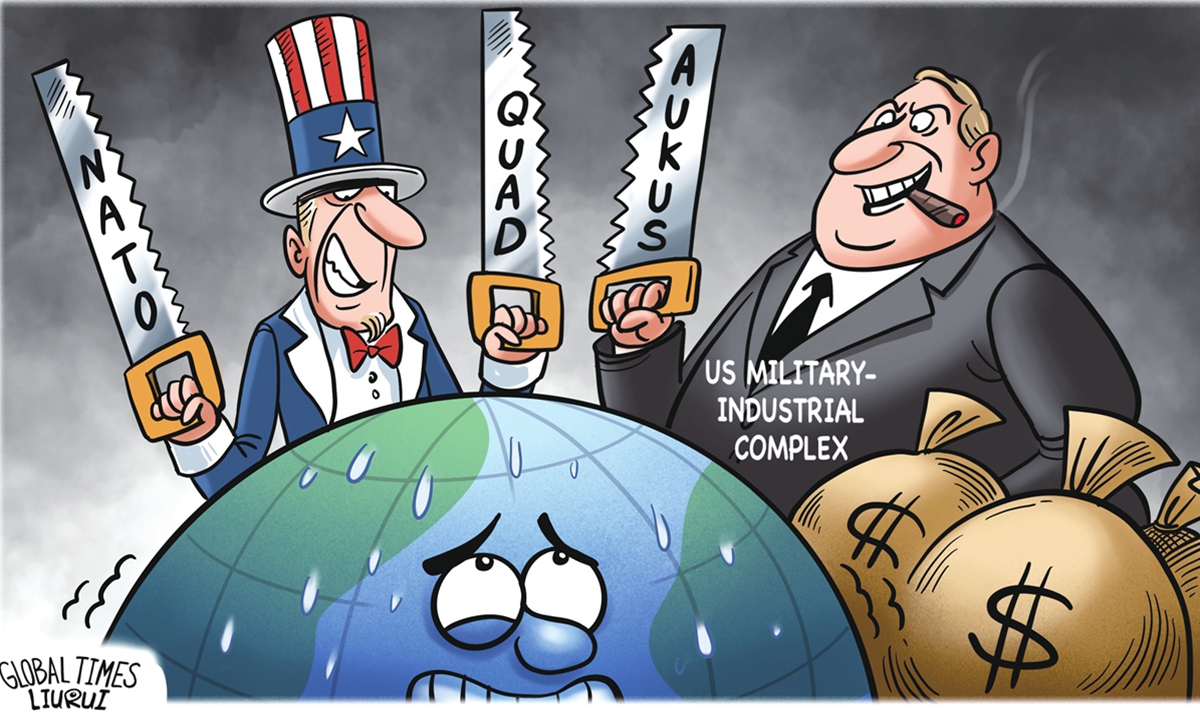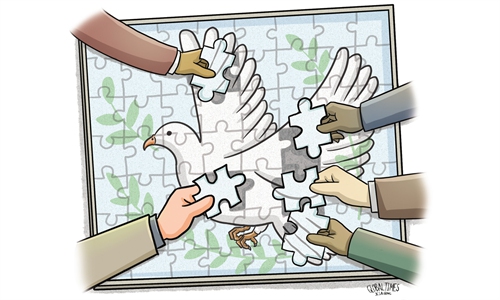
Illustration: Liu Rui/GT
Recently, some Western politicians have been talking about the possibility of a third world war, claiming that they see the shadow of conflicts looming over the Taiwan Straits, the Korean Peninsula, the South China Sea, and even the entire Asia. Some have even gone so far as to label Russia, China, and Iran as the "new axis powers."
Past experience, if not forgotten, is a guide for the future.
The world has entered a new period of change and turbulence. There are some similarities between the current situation and the eve of the two previous world wars.
Worsening domestic problems in developed countries such as the economic slowdown are spilling over into other countries. The hegemonic power obsessed with preserving its supremacy is stoking great power competition. Regional conflicts are more likely to spiral out of control, increasing the risk of bloc confrontation. Populism, protectionism, and extreme right-wing ideologies in the West are on the rise. Major countries lack mutual trust and coordination. All these have added to the uncertainty and instability of the world and undermined the effectiveness of the international system.
To put it in a more straightforward manner, it is the US, the world's sole superpower, that has become the source of the risk of another world war in many ways.
The US attempts to mold other countries' systems and shape the world order based on its own values and in its own image and divides the world into "democratic" and "non-democratic" camps by promoting a "democracy vs. authoritarianism" narrative.
The US acts against globalization. It undermines global cooperation mechanisms, and abuses its financial hegemony to export inflation, forcing other countries especially the emerging economies to foot the bill. It restricts trade and economic cooperation, citing fake politics and security claims, and pushes for decoupling of economies and the building of a small yard with high fences to reshape the international economic and trade landscape for its own benefit.
The US keeps fueling the flames in regional conflicts, while its military-industrial complex enjoys a windfall of earning from wars. The best proof is the current Ukraine crisis. While people in the conflict areas have had their lives destroyed, Washington sees arming Ukraine as good for growth in the US economy and a win-win that needs to be continued.
In order to contain China, the US attempts to woo its allies and partners with the "integrated deterrence" concept, promotes an "Asia-Pacific version of NATO," chants the false narrative of "Ukraine today, Taiwan tomorrow," and even signals willingness to use its military assets to prop up some in Taiwan island.
Lasting peace is just an illusion under hegemonism. Throughout its more than 240-year history, the world's hegemon was not at war for only 16 years. Anxious to protect its global dominance, the moves it may take, with its unrivaled military expenditure, should be watched with great vigilance.
Considering these negative factors, is World War III really inevitable? Well, just as every cloud has a silver lining, there are still many important positive factors that can help prevent a war from breaking out.
The force for peace and development continues to grow. Trends toward a multi-polar world and economic globalization are creating closer links among nations and enhancing people's sense of living in a community with a shared future. This will help keep a global war at bay.
An anti-war sentiment remains strong. Albert Einstein once said, "I know not with what weapons World War III will be fought, but World War IV will be fought with sticks and stones." The two previous world wars tell us that war is not the best way to resolve disputes, and the world cannot endure any more scourge from another full-scale war. The more chaotic the world is, the more people desire stability.
The international peace mechanism has been strengthened. The UN has been the mainstay of the global governance system over the past decades. Despite voices of doubt from time to time in recent years, it is undeniable that the UN has been playing an active role in maintaining international security, advancing arms reduction, and tackling global challenges.
The US fears the cost of a nuclear war. Nuclear weapons have profoundly changed the nature of war. Under nuclear deterrence, the US is more inclined to launch "proxy wars" or stoke regional conflicts, allowing it to continue keep selling arms to and seizing wealth from relevant parties.
China's development is a boost to the global force for peace. Committed to peaceful development, China is blazing a path of peaceful rise distinct from the trajectory of traditional powers. It has codified the Five Principles of Peaceful Coexistence into the country's Constitution as a cornerstone of its independent foreign policy of peace, and has been actively promoting talks for peace as the way to solve conflicts and disputes.
Human beings are once again standing at a historical crossroads. The choices we make today will shape the world tomorrow. As we navigate the current turbulent times, it is imperative that we bear in mind the lessons of the past and make sure history will not repeat itself.
The author is a commentator on international affairs, writing regularly for Xinhua News Agency, Global Times, China Daily, CGTN etc. He can be reached at xinping604@gmail.com

